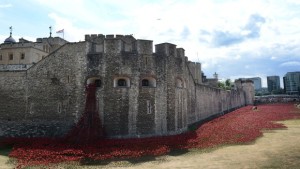 We are in the midst of the centenary for World War I. The recent placement of red ceramic poppies in the moat surrounding the Tower of London brought home its horror: a sea of red, 888,246 poppies, representing British commonwealth soldiers killed, only part of the estimated millions of deaths, civilian and military, for all the nations involved. Most of the soldiers were young men in the prime of life, forever unable to live the productive lives that would benefit their nations.
We are in the midst of the centenary for World War I. The recent placement of red ceramic poppies in the moat surrounding the Tower of London brought home its horror: a sea of red, 888,246 poppies, representing British commonwealth soldiers killed, only part of the estimated millions of deaths, civilian and military, for all the nations involved. Most of the soldiers were young men in the prime of life, forever unable to live the productive lives that would benefit their nations.
Today we acknowledge how horribly stupid this war was. A royal was shot in Serbia. Different nations lined up, driven by pride and perceived loyalty. Leaders thought the war would be a simple skirmish, over with in a short time. It wasn’t. Modern weapons changed the way wars are fought.
The reminder of that war, and the absurdity that so-called civilized nations allowed it to happen, caused me to examine more closely the Iranian nuclear deal that is going through the paces. I think I must support it.
Do we want to be part of another war in the Middle East? Look at the horrors unleashed by the last one we initiated.
World War I (and probably World War II, its continuation) wouldn’t have happened if nations had backed down, swallowed a little of their pride, been reasonable. But they didn’t. It wouldn’t have been a perfect deal for anyone but better than the alternative of WW I.
Negotiations are so much harder than starting a war, in the give and take, in the lack of complete victory for one side or the other. They are, however, superior to the alternative.

